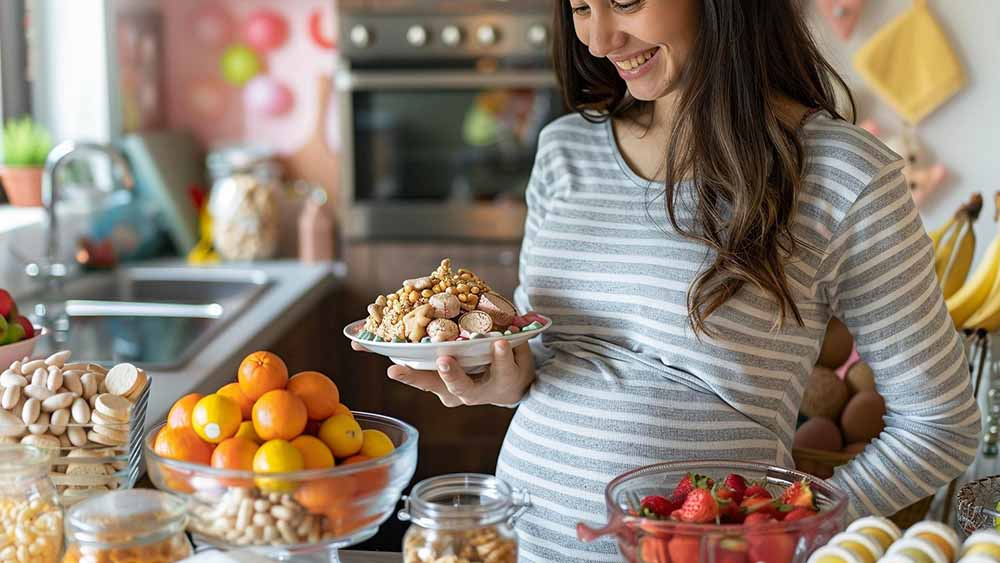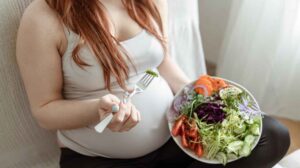Though iron is a very important nutrient for everyone, during pregnancy, this nutrient becomes highly critical. Increased blood volume in pregnancy requires additional iron to help in carrying oxygen both to the mother and the developing baby. Iron deficiency during pregnancy results in anaemia that may be manifested by fatigue, weakness, and complications such as delivering a low birth-weight baby or prematurity in severe cases.
Fortunately, consuming iron in sufficient quantity will enable you to fulfil the nutritional need which is heightened at this phase of life.
Why Iron is Crucial for Pregnant Woman
- Blood Volume Expansion: A pregnant woman experiences a hike of about 50% in her blood volume. Iron helps in the production of haemoglobin protein found inside the red blood cells that help in transporting oxygen.
- Developing Baby: Iron contributes to the growth and development of your baby, particularly for brain development and the production of red blood cells.
- Preventing Anemia: Iron deficiency anaemia, occurring during pregnancy, is marked by symptoms of fatigue, dizziness, and weakened immunity, along with increasing the risk of complications that may arise due to preterm labour.
Best Iron-Rich Foods During Pregnancy
-
Lean Red Meat
Outstanding amounts of heme iron are also found in lean cuts of red meat, a good example being beef and lamb. The inclusion of red meat in the diet will make the achievement of daily iron intake quite easy.
- Serving Size: 100g cooked beef serving size contains 2.7 mg of iron.
- Tip: Choose lean cuts to minimize fat intake while benefiting from the iron in the red meat.
-
Poultry
Iron is particularly abundant in chicken and turkey, especially the darker meat. Chicken has heme iron, which is more bioavailable than plant sources of iron.
- Serving Size: In cooked turkey, about 1.4 mg is found in every 100g portion.
- Tip: Eat a variety of poultry over the week for nutritional completeness.
-
Fish
Iron-rich fish include sardines, salmon, and tuna; these fish are also valuable sources of omega-3 fatty acids that support the health of both mom and baby.
- Serving Size: One serving size of canned sardines contains approximately 2.9 mg of iron.
- Tip: Fish with high mercury content, such as swordfish and king mackerel, should be avoided during pregnancy.
-
Spinach and Leafy Greens
Leafy greens are an excellent source of plant-based non-heme iron. While not as bioavailable as animal sources, the non-heme iron in leafy greens can be improved when consuming it with vitamin C-containing foods.
- Serving Size: One cup of cooked spinach provides 6.4 mg of iron.
- Tip: Boost your iron absorption and add lemon juice or bell peppers to your spinach salad.
-
Legumes
Beans, lentils, chickpeas, and soybeans are good sources of non-heme iron and a phenomenal protein addition to your diet.
- Serving Size: One cup of cooked lentils equals about 6.6 mg of iron.
- Tip: Cooking beans with tomatoes will enhance the iron absorption of beans; similarly, serving beans with a dressing containing some form of citric acid will improve iron absorption.
-
Fortified Cereals
Many breakfast cereals are iron-fortified, hence becoming one of the quickest ways to rev up your iron especially if consumed in the morning.
- Serving size: A single serving of iron-fortified cereal provides around 4 to 18 mg of iron, depending on the brand.
- Tip: Choosing an iron-fortified cereal with less sugar will give you an advantage over other nutritional values.
-
Nuts and Seeds
Among nuts and seeds, pumpkin seeds, sunflower seeds, almonds, and cashews have the most milligrams per serving and are considered a healthy snack or could be added to many dishes.
- Serving Size: One ounce, about 28g, serving of pumpkin seeds provides about 2.5 mg of iron.
- Tip: Nuts and seeds are best eaten with fruits containing vitamin C to enhance the absorption of non-heme iron.
- Tips for Enhancing Iron Absorption
- Match Iron with Vitamin C: Citrus fruits, tomatoes, and peppers are just a few examples of those that can enhance non-heme iron absorption.
- Avoid Drinking Tea and Coffee with Meals: These contain substances which hinder iron absorption. You can have them between meals, though.
- Cooking in Cast Iron Pans: The use of cast iron pans will raise the iron content of the food while preparing acidic foods like tomatoes.
Conclusion
Iron levels during pregnancy should not be allowed to go below a certain level for the health and wellness of both mother and child. Iron deficiency may be avoided and a healthy pregnancy ensured by including different iron-rich foods in one’s daily diet.
Remember that both the sources of heme and non-heme iron have to be balanced and combined with foods rich in vitamin C to enhance absorption.
Always consult your health provider to monitor your iron level and see if an iron supplement is necessary or needed.





